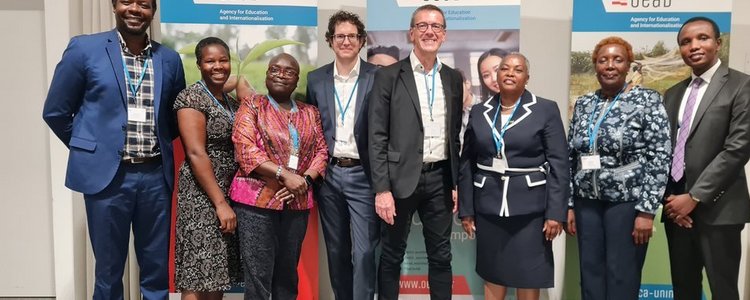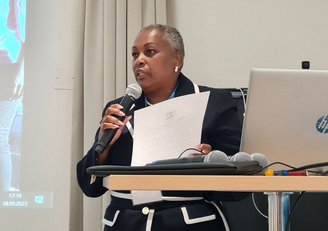Gerhard Volz, Head of International Cooperation in Higher Education at the OeAD, welcomed the guests and explained the idea for the Country Talks. The aim of this series of events is to present countries or regions of the world that may not be known in Austria as typical partner destinations for higher education cooperation. As a former partner country of the Austrian Development Cooperation, long-term projects in the field of higher education and development are relevant. More recently, the Austrian-African Research Network (Africa-UniNet) and Erasmus+ have provided new opportunities for cooperation between Kenya and Austria.
Gerhard Volz welcomed H.E. Ambassador Mary Mugwanja of the Republic of Kenya and appreciated her presence at the OeAD. H.E. the Ambassador thanked the OeAD for the opportunity to describe the cooperation between Kenyan and Austrian higher education institutions.
Kenya's new government, led by His Excellency Dr William Ruto, has outlined a number of policy initiatives and reforms aimed at strengthening the education sector and ensuring that the country's substantial public investment in education - which amounts to approximately Kenyan shillings 630 billion per annum (approximately EUR 4.06 billion) - is maximised. Some of the key highlights of the ongoing reforms include: 1) A comprehensive review of the laws governing the education sector to address governance and financial issues. 2) Increasing the use of technology in the delivery of education to modernise learning and teaching methods. 3) Address existing funding gaps in higher education institutions to prevent universities from incurring unmanageable debt and to 5) Provide resources to ensure equitable access to educational resources for all learners regardless of their family background. She stressed that the Kenyan government is optimistic that these policy initiatives will improve the quality of education, ensure equity and create opportunities for learners at all levels. HE the ambassador concluded by emphasising the Embassy's keenness to expand Kenya-Austria cooperation in higher education and invited all partners present to involve and utilise the Embassy in the implementation of the outcomes of today's discussions and all future endeavours to develop Kenya-Austria partnerships in higher education.
Former OeAD scholar Felicia Arudo Yieke then invited us in her presentation on a short trip to get to know Kenya. She is currently Professor of Applied Linguistics at the University of Laikipia and holds a PhD in Applied Linguistics from the University of Vienna, Austria. Felicia presented some facts about the geography - from the coastal areas to the Rift Valley and to Mount Kenya - and the main economic activities such as agriculture and tourism. In particular, she highlighted the ecological and economic importance of the national parks. She gave a brief introduction to the political system and pointed out the new constitution promulgated in 2010. She also highlighted the country’s cultural diversity with some 42 ethnic groups. Kenya is a multilingual country with more than 60 languages and a large number of Kenyans speak at least three languages to varying degrees (Swahili, English and a vernacular). The higher education sector in Kenya has expanded rapidly over the last three decades. From a single public university (University of Nairobi) and a single private university (USIU) in 1970, Kenya's higher education sector comprised a total of 74 institutions in 2018. She concluded her presentation by introducing the new Higher Education Fund and the key players in financing students and their studies.
In between the different speeches, Mfilinge Pascal Nyalusi read poems in Swahili and one in English, discussing issues of intercultural communication, but also introducing us to the beauty and melodiousness of the Swahili language. He teaches Swahili Conversation at the Institute of African Studies, University of Vienna and is a member of the Vienna African Writers Club. In 2018, he published the poetry collection "The Fuss", which explores how different societies live together and react to each other.
Gerhard Volz presented facts and figures on higher education cooperation between Kenya and Austria and the role of the OeAD in implementing various programmes. Since 1984, the North-South Dialogue Scholarship Programme, funded by the Austrian Development Cooperation (ADC), has supported people from Kenya to study in Austria. When the new higher education cooperation programme APPEAR was launched in 2009, former scholarship holders played an important role as multipliers and cooperation partners. This also led to strong participation of Kenyan institutions in programmes funded by the Austrian Federal Ministry of Education, Science and Research (BMBWF) and implemented by OEAD, such as the Cooperation Development Research Programme and the Austrian-African Research Network (Africa-UniNet), which was initiated by the BMBWF as part of the national follow-up to the EU-Africa Strategy. The new cooperation opportunities through the various Erasmus+ programmes funded by the European Commission have gained importance in recent years and are reflected in the organisation of a joint event "2nd Africa-UniNet General Assembly | Erasmus+ Cooperation Seminar" at Egerton University, Kenya, in October 2022. Detailed information on the programmes and participating institutions can be found in the presentation and the overview.
The next presentation on the water, energy and food (WEF) nexus was given by Prof. Luke Omondi Olang of the Technical University of Kenya, also a former scholar. The continuing role of climate change and variability in influencing the distribution of resources within the nexus across Africa was highlighted. A practical illustration of how challenges within the nexus can be addressed through institutional and regional cooperation within Kenya and Uganda was given, based on a project recently funded by APPEAR.
The important role of capacity building, not only at university level, but also by strengthening the role of local institutions and stakeholders who are often charged with the day-to-day management of resources, was also highlighted. Prof. Olang received his PhD from the University of Natural Resources and Life Sciences (BOKU), Vienna, Austria, and has been involved in several research projects with his former host university.
The next part of the Country Talk focused on cooperation in higher education within the International Post-Graduate Education & Research Hub in Limnology (IPGL) and the Austrian-African Research Network (Africa-UniNet). Dr. Nzula Kitaka is Associate Professor of Aquatic/Water Science at Egerton University and the Vice-president of Africa-UniNet. She underlined that Africa-UniNet provides a unique opportunity for cooperation between Austrian and African institutions to share ideas and build capacities in higher education and research. Africa-UniNet is contributing to Internationalize member institutions and to create transformative pathways and new knowledge for societal and humankind advancement. Dr. Kitaka has been involved in the establishment of a major regional training programme for water scientists and managers. This course evolved as Limnology of Wetland Ecosystems (LWE) from 2009 to a Joint Degree in Limnology and Wetland Management (LWM) from 2012 to date in Partnership between Egerton University-Kenya, BOKU, Austria and IHE-Delft, The Netherlands. Regional and national partnerships have also been established, leading to new and innovative capacity development initiatives. More details can be found in her presentation.
The next speaker added another facet to the various cooperation patterns between Kenyan and Austrian universities. In his presentation, Franz Stefan Michalke, Head of Team International Cooperation, University of Vienna gave valuable insights into the genesis of the partnership between the University of Vienna and Moi University and the institutionalisation of this cooperation within an Erasmus+ project (KA171). Based on initial personal relationships at faculty level, the demand for a more formal cooperation has emerged on both sides. Despite mutual interest in cooperation, it was a long process until an agreement could be signed that regulates the processes of cooperation. The main interest of the cooperation between the two universities has always been mutual exchange of students and teachers, therefore Erasmus+ International Credit Mobility (KA171) was considered an appropriate instrument to achieve this goal. As for many projects, personal contact is the starting point of any cooperation, yet there are other factors needed to get cooperation off the ground: clarifying and managing the expectations of the cooperation partners involved, removing bureaucratic barriers within the institutions, meet deadlines and administrative criteria within Erasmus+ and admitting that any cooperation is an ongoing mutual learning process. Further details can be found in his presentation.
After the presentations of the speakers, Felicia Arudo Yieke, Luke Omondi Olang, Nzula Kitaka and Franz Stefan Michalke joined the podium for a round table to determine what are the major issues of research cooperation between Kenya and Austria.
One question was to clarify what is needed to build up long-lasting and sustainable partnerships. Nzula Kitaka emphasized that to build up sustainable partnerships, it is needed to build up trustful ties with the persons you would like to cooperate with. The persons involved are the driving forces for institutionalising a newly set-up cooperation. Any cooperation needs trust, and the first level of trust is established on a personal level. Once mutual trust is at stake and there is a suitable funding scheme that allocates funds to the project, the scope of the project will increase over time. One example is Africa-UniNet, which was initially very much dependent on the efforts of individuals and has since become an ideal network for exchanging ideas and an excellent tool for capacity building. Franz Stefan Michalke agrees to this point and adds that the importance of the personal level depends on the different stages of the cooperation. While the personal level is crucial for the institutionalisation of cooperation in the initial phase, its importance decreases somewhat once there are established patterns of cooperation.
Another vital issue in research cooperation between Kenya and Austria is the dissemination of project results. All speakers on the panel unanimously agree that the knowledge that is gathered and generated in projects of all kinds must be fed back into the communities to bridge any gap between the communities and academia. For Luke Omondi Olang, people's needs are not at the end of the research process, but at its beginning. His research on the water, energy, food nexus, clearly addresses climate change and issues relevant to the day-to-day livelihoods of people. Nzula Kitaka also pointed out that communities may be important partners in the research process. Stakeholder participation and the dissemination of project results beyond academia are therefore essential.
Finally, it was discussed which target groups should be addressed through funding schemes in higher education cooperation. While the initial focus of cooperation tended to be on scholarship programmes, funding individual scholars to pursue a degree or to do research, there has been a shift to institutional cooperation in the last years (Erasmus+, Africa-UniNet). Felicia Arudo Yieke indicated that it is important that both target groups are addressed and highlights that former scholarship holders may be ambassadors between institutions. Gerhard Volz pointed out that in the light of the different opportunities for cooperation in higher education between Kenya and Austria, it is key to recognize the variety of funding schemes and to acknowledge that they complement each other well in many cases.
The moderator, Stella Assiimwe (Weltmuseum), closed the panel discussion by inviting the participants to view the photographs of Nina Zuckerstätter, a professional photographer and former programme officer of the OeAD. The exhibition showcased her work from her time in Kenya in October 2022 during the 2nd Africa-UniNet General Assembly, where she was the photographer for the event. The exhibition complemented the event with photographs of strong Austrian-Kenyan partnerships in higher education and research, the fertile grounds of Egerton University where the General Assembly was held, and Kenya's fascinating landscapes and national parks.
The evening was rounded off with some delicious Kenyan food and drinks and an opportunity to socialise and network.
Podcast County Talk Kenya 2023 can be found here.

